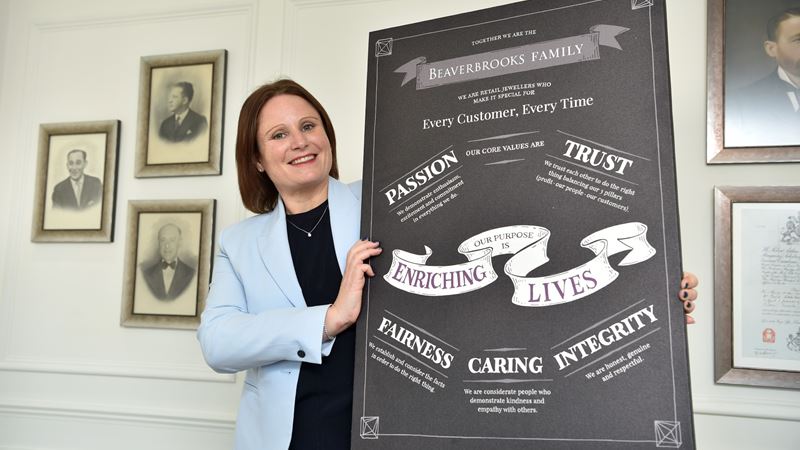Business
Anna Blackburn: A sparkling performance

Published
3 years agoon

Family-owned jewelry business Beaverbrooks shined brightly in 2019 when it celebrated its centennial and its most profitable year financially ever. Then it was the year 2020.
As the director of operations, Anna Blackburn, explains: “We were at the top of an upswing. We then came out of the centenary year and entered lockdown from the highest of highs down to lower lows.”
Stores shut their doors, and uncertainty was present, and, as retail businesses around the world, the St Annes firm was thrown into a world that was not yet known.
It’s fair to say that it has performed very well. In reality, it can even be said that Beaverbrooks has experienced a successful disease. To quote the government’s slogan “Building back,” it has done more effectively.
In the year of the centenary, the profits exceeded PS17.8m. The company aims to surpass PS30m which is an annual increase that is more than 30 percent.
It’s a fantastic performance that has the unique ethos of Beaverbrooks at the heart of it. There’s beyond this Lancashire business than the sale of jewelry, and it’s a success in achieving them.
As part of its goal to “enrich lives,” Beaverbrooks contributes 20% of the profits it earns. Additionally, it has been a regular participant in the United Kingdom’s annual ‘100 Great Companies to work for’ being ranked for 18 consecutive years. In addition, it was listed as the top ‘Best Place to work in the UK in the year 2024/22.
The more successful we become in our business, the more profitable we become, and the more we can contribute to the community.
The attention, even before the pandemic, was on the people. When Covid hit, that focus grew. Beaverbrooks made significant investments in PPE and safety measures throughout the company, rearranging the working environment in warehouses and stores and providing home-based work for the head office staff.
The bright room that is airy and spacious, which is surrounded by photos and documents that reflect the company’s rich background, Anna, who has been recognized by many as among the UK’s top leaders, considers the driving factors that led to what she calls a “brilliant year.”
She states: “It’s a combination of things. The jewelry industry has performed very well. It has seen more income available, people not capable of traveling, and people getting fed up.
“We saw a lot of people who wanted to pamper themselves with the most exclusive Swiss watch. There were many engagements. Many people have wanted to present gifts to their loved ones to show how much they appreciate them during tough moments.”
She continues: “From the very beginning of the pandemic, we examined our strategy, reviewed our position, and considered the worst-case scenarios.”
“I believe that none of us anticipated that we’d be in a position to stay for the entire calendar year. However, we needed to ensure that we emerged from this, however, it was, as solid as we could. The colleagues were aware that they had our backs They knew they were the top priority for us.”
Beaverbrooks has 71 stores in the UK and employs around 1,000 employees. Anna insists that the company did not make any redundancies due to Covid.
She continues: “I had to spend time with landlords negotiating and having some fantastic discussions about partnerships. I also ensured that we were with the most forceful arguments we could. We worked with lots of our landlords, sharing the burden.
“We continue to put money into new products, transformed our entire office and warehouse to run our online-based business. We took 19 days to redesign our warehouse.

“During lockdown last year, we have created a brand new luxury prestige brand. We have also purchased two stores. The brand’s name is Loupe We are extremely excited about it. We believe it will become a game-changer in the market for luxury. Loupe is all about the quality of its products and a space where people want to be in.”
Loupe is an eyeglass used to make jewelry and is a crucial instrument for watchmakers. A Milton Keynes flagship store and an additional Croydon boutique are scheduled to open later in the year, and an online store is coming soon.
Along with the growth in online shopping, which has continued even though the country is opened its doors, massive rises in Beaverbrook’s mail order and phone sales.
Anna states: “We’ve talked a lot about confidence, about resilience and investment within the business.”
And she’s looking at the near future with cautious optimism despite the imminent inflation-driven crunch. “There are plenty of reasons why business could be a struggle,” she states. “But it is true that there are many reasons as there is to be a reason why our strengths as a business will not diminish.
“There’s the three-year recap on weddings. There will be a desire to mark meaningful life important events. This is why Beaverbrooks can help with the high-quality of our products and the service we provide to our customers.
“There’s no doubt about the decline in footfall in the high street, but we are finding customers are spending longer in-store and are spending more money.”
Anna joined the company as a graduate student in the year 1998. After progressing through the ranks, she then accepted the post of chief executive officer in the year 2013.
The appointment was significant in two ways – she was the first female CEO and the first non-family member to assume the position.
The position was re-defined after she was appointed the managing director in 2018, which made her the only non-family member on the board and confirmed her position as the most critical member of the organization.
Anna’s first job was as a sales consultant for Beaverbrooks’ Trafford Centre store. She was a candidate after returning from a period of travel following her university studies in Manchester, in which she was a student of sociology and economics.
She said: “I thought it was the right time to find an opportunity to work. I love jewelry, so I noticed the job ad and then went to learn everything about the company prior to going to the interview.”
She was pleased with what she saw. “I’d spent the entire year in Africa working in one of the Aids orphanages located in Malawi. I was determined to help make a difference.” Anna explains.
“The company I worked for at the time was donating 10 percent of their profits every year to charities. That has now increased to 20 percent. I was amazed that I was able to participate in the company.
“It was the family feeling and the values that attracted me. I also had the chance to progress, even though I didn’t think I’d find myself in this post. I believed that there could be a career that was worth it. The people’s investment, cause, and work ethic all convinced me to say “yes to this; this is the place I’d like to go’.”
Anna was a frequent traveler across the United States throughout her career as her business grew, with a few trips near the north-western border region of Scotland and meeting the man she married at Beaverbrooks. They have two kids, aged between 10 and 14, and are located near their home at St Anne’s head office.
Anna has spent her entire career pioneering and is an individual who has made an impression. But when she is about making an impact, she believes that it’s not about gender. Instead, it’s about having what she refers to as “emotional intelligence.”
She continues: “It is the ability to make a tough decision and then justify the reasons for it. Empathy and compassion are the essential qualities of any leader, male or female.
“Our products are great however, we’re ultimately a business run by people. Empathy and listening to your customers are essential. It’s all about building relationships and the power of the people.”
Ensuring that people are empowered and developing Beaverbrooks’ values in business have been at the forefront of her work in developing Beaverbrooks and how it has emerged from recent difficulties.
She has set out to demonstrate that treating employees right is reflected in the bottom line. Since she took on her role as a senior manager, she has been working to build an extremely responsible, committed team with high levels of satisfaction with work.
To achieve this, she speaks regarding “fairness” and “trust” and a “level of honesty,” that is, she claims, “because we want people to do well.”
Anna says: “It’s a culture where people aren’t afraid to open their arms and admit they did the wrong thing’. It’s about accepting the idea of engaging in open and honest discussions.
“We are determined to be a good employer and an excellent workplace, which requires engagement from all employees. They must feel that they can contribute to the company’s success and feel believe they are accountable towards their team members, themselves, and the business.
“The feedback culture we’ve implemented is vital as it shifts the culture towards one that is collaborative. It’s the importance of having the appropriate people in the room, and being open, honest, and open.”
She also hosts focus groups that allow her to connect with colleagues from all over the business and hear their opinions.
Overall, it’s an effective strategy. Anna mentions that one in five of Beaverbrooks’ staff has been with the company for over ten years.
She adds that at the close of the current year’s financial year, the company will have donated PS17.5m to charitable causes since 2000 and is a patron of more than 250 charities.
She adds that “It’s not just about the charitable aspect. Our entire ethos and mission as a company is improving lives.
“The more successful we are as a business, the more profitable we are, the more we can give to the wider community, and that is a massive driver for me personally.”
The commitment to give continues for her even after she leaves the workplace. Anna is active in charitable work and cooks for The Streetlife homeless charity based in Blackpool.
She’s also done long-distance hikes to raise funds for charitable causes. She’s considering the possibility of a tower-to-tower virtual trek, which would mean walking similar to Blackpool from Paris by miles.
Walking was therapeutic during the epidemic as it allowed her to re-energize and develop her awareness.
Anna states: “I was exhausted by the time the year ended. I was constantly reassuring people and keeping things in order. I’ve learned a lot about myself through the ability to bounce back.”
And her tips for people at the beginning of their career? “Find something that you love and love. When you’re working on something that you like and enjoy doing and you’re skilled doing it well, you’ll have success.”
Related Posts:
- Blackburn and Darwen's health bosses reflect on his…
- Ten noteworthy businesses closed in Toronto this month.
- Winners 2024 China-Scotland Business Awards Announced.
- Helpful Collective provides an accessible location…
- Red Luxury buys US brand The M Jewelers.
- Fujifilm's Organization is Flourishing As a result…
Hi, my name is Nebojša, and I've been involved in digital marketing for over 15 years. I've written for various websites, covering a wide range of topics. I'm particularly interested in subjects like technology, gaming, app development, and I also have a passion for automobiles. Additionally, I work on SEO optimization. In my free time, I enjoy reading, walking, traveling and spending time with my wife and daughter.

You may like
Business
How to Cut Costs on Shipping to Amazon Warehouses – 2025 Update
Published
3 weeks agoon
June 16, 2025
Shipping products to Amazon FBA warehouses is a major expense for third-party sellers. Whether you’re shipping a single box via SPD (Small Parcel Delivery) or pallet loads through LTL/FTL (Less Than Truckload/Full Truckload), shipping costs can eat up 15% to 40% of your total margin if not carefully optimized.
In 2025, with higher fuel surcharges, regional delivery bottlenecks, and Amazon’s stricter FBA receiving policies, cutting shipping costs is no longer optional—it’s a necessity for profitability.
Checklist for Cutting Amazon FBA Shipping Costs
| Action | Benefit |
| Use Partnered Carriers | Save 30–70% on SPD/LTL rates |
| Consolidate into LTL when possible | Reduce per-unit cost and handling fees |
| Ship from prep centers near FCs | Shorten the last-mile distance |
| Use standard box/pallet dimensions | Avoid oversized penalties |
| Automate with FBA software tools | Reduce labor cost, avoid prep errors |
1. Choose the Right Shipping Method: SPD vs. LTL/FTL
Many sellers default to SPD because it’s familiar and easier to set up. But as your shipment volume grows, this method quickly becomes inefficient. If you’re sending multiple boxes regularly, switching to LTL or FTL can significantly lower your per-unit cost.
LTL is ideal for 1–4 pallets, while FTL becomes more economical once you’re shipping 20+ pallets. The larger and more frequent your shipments, the more you save through freight consolidation and pallet optimization.
| Shipping Method | Best For | Typical Volume | Cost Efficiency |
| SPD (Small Parcel) | Low-volume shipments (<150 lbs per box) | Under 10 boxes | Low to Moderate |
| LTL (Less Than Truckload) | Medium-volume shipments | 1–4 pallets | High for consolidated loads |
| FTL (Full Truckload) | Large shipments to one FC | 20+ pallets | Very high if volume allows |
Always run a side-by-side cost analysis between Amazon’s partnered LTL and SPD options for the same shipment. Even at lower volumes, LTL can beat SPD in cost-per-unit when handled correctly.
2. Optimize Box and Pallet Dimensions

Smartly stacked boxes and pallets in Amazon warehouses highlight how optimizing dimensions helps maximize space utilization
Dimensional weight pricing has become the standard for carriers, meaning your shipping bill depends as much on volume as on actual weight. Oversized packaging, under-filled boxes, or poorly stacked pallets all translate into wasted money.
Even minor changes to your box dimensions can cut down on shipping charges significantly. It’s especially important to standardize carton sizes across SKUs and ensure you’re getting the most efficient stackability when using LTL or FTL.
| Packaging Type | Cost Impact | Optimization Tip |
| Oversized Boxes | Higher per-unit cost + surcharges | Split items into smaller boxes |
| Inconsistent Sizes | Inefficient pallet use | Use standard cartons |
| Poor Pallet Stacking | May result in Amazon rejections | Follow Amazon’s FBA pallet guidelines |
A Freightos shipping case study found that by trimming box height by just 2 inches across 300 monthly units, one seller saved $420 in dimensional weight charges over 30 days.
3. Consolidate Shipments Strategically
Frequent small shipments often result in higher per-unit shipping costs, more carrier pickups, and a higher likelihood of fulfillment center delays. Consolidating multiple small shipments into a single, well-organized load saves on handling and often qualifies for better freight rates.
More importantly, Amazon prefers well-labeled, bulk deliveries over fragmented ones, which can
delay check-ins during peak seasons.
| Scenario | Estimated Monthly Shipping Cost | With Consolidation |
| 4 SPD shipments × 10 boxes | $900 | $540 |
| 1 LTL pallet shipment (same qty) | — | $480 |
If you’re using a prep center or 3PL, schedule shipments biweekly or monthly instead of weekly. Many centers will hold goods for a few extra days to help you consolidate at no added cost.
4. Use a Prep Center Near Amazon FCs

A prep center near Amazon warehouses ensures faster and more accurate processing of shipments ready for dispatch
Shipping across the country adds avoidable costs, especially if your inventory is already located closer to Amazon’s main fulfillment hubs, according to Dollan Prep Center. Working with a prep center within a short distance of Amazon’s major FCs helps you reduce last-mile freight charges, shorten delivery windows, and reduce potential delays during appointment scheduling.
This also increases the chances of faster check-ins and fewer rescheduling penalties.
| Top FC Regions | Benefits of Nearby Prep Centers |
| Dallas/Fort Worth, TX | Central location, multiple nearby Amazon FCs |
| Hebron, KY | Common FBA inbound point for East Coast sellers |
| Moreno Valley, CA | Ideal for West Coast imports from Asia |
| Allentown, PA | High Amazon FC density, fast East Coast distribution |
Relocating your prep and storage from the West Coast to Kentucky or Ohio can reduce per-pallet shipping costs by 20–30%, especially for sellers distributing nationwide.
5. Leverage Amazon’s Partnered Carrier Program
Amazon offers discounted rates through its partnered carrier program, which includes both UPS for SPD shipments and several freight providers for LTL and FTL loads. These discounts are only available if you create shipments directly through Seller Central and use Amazon’s pre-approved carriers.
In most cases, Amazon’s partnered rates beat outside quotes, even those from negotiated commercial accounts.
| Service | Estimated Discount |
| Partnered SPD (UPS) | 30%–50% |
| Partnered LTL (XPO, CEVA, etc.) | 40%–70% |
While you must comply with Amazon’s strict packaging and labeling requirements to access these rates, the savings are substantial, l—especially for high-volume sellers or those regularly shipping to distant FCs.
6. Reduce Rejected Shipments with Better Labeling and Packing

Neatly stacked boxes in Amazon warehouses demonstrate strategies to reduce rejected shipments and improve delivery efficiency
FBA rejections are costly and often entirely avoidable. If your shipment arrives with incorrect labels, mixed SKUs, damaged boxes, or non-standard pallets, Amazon may either reject the shipment or charge you additional fees for correction.
These mistakes lead to delays, inventory miscounts, and wasted freight costs. Proper prep practices—including double-checking barcode placements and securely packing all cartons—go a long way in avoiding financial hits.
| Mistake | Possible Charge |
| Wrong label placement | $0.20–$0.30 per unit |
| Unscannable barcode | $0.15–$0.40 per unit |
| Rejected pallet | Full reshipment cost |
Based on Amazon seller reports, approximately 1 in 5 shipments that result in receiving delays are traced back to labeling or prep errors, ot transport problems.
7. Compare 3PL and Freight Forwarder Rates
Freight pricing varies widely depending on your route, volume, and carrier network. Many sellers overlook potential savings by sticking with default options like Amazon Partnered LTL when they could secure lower rates via third-party logistics (3PL) providers or freight brokers.
For international shipments, especially from Asia, consider FBA-friendly freight forwarders who understand Amazon labeling and delivery protocols.
| Shipping Scenario | Amazon Partnered Rate | 3PL Broker Rate | Savings Potential |
| 3 pallets to California FC | $620 | $520 | ~$100 (16%) |
| Full container from China | $2,400 | $1,800 | ~$600 (25%) |
Always confirm that your 3PL or freight broker can handle Amazon’s strict delivery appointments and ASN documentation. Mishandled deliveries can delay check-in by days or even weeks.
8. Use Software to Automate and Optimize Shipping
Managing logistics manually might work at a small scale, but as your operation grows, automation is critical. FBA-compatible software can help you generate labels, track freight costs, schedule restocks, and reduce prep errors.
Most tools also offer data dashboards that allow you to compare historical shipping costs and identify which products are the most expensive to move.
| Tool | Functionality |
| InventoryLab | Shipment creation, cost tracking, and label printing |
| RestockPro | Restocking suggestions and forecasting |
| ShipStation | Multi-carrier shipping rate comparisons |
| Sellerboard | Profit analysis, including logistics cost modeling |
Automating shipment creation and integrating freight cost visibility into your inventory management can help reduce administrative time by 20–30% and prevent avoidable prep center errors.
9. Negotiate Better Terms with Your Prep or Freight Providers
Shipping costs are not always fixed. If you’re consistently sending volume to FBA, you have leverage. Many prep centers, LTL brokers, and freight forwarders offer volume discounts, flat fees per pallet, or reduced storage costs if you ask.
Review your past 3–6 months of shipping data, calculate your average pallet count, and initiate a negotiation with your vendors.
Tip: Sellers averaging 10+ pallets per month can often secure flat monthly pallet rates, discounted receiving, or free shrink-wrapping—terms that reduce your cost per unit long term.
10. Eliminate Dead Weight: Audit Unprofitable Shipments

A focus on eliminating dead weight in Amazon warehouses leads to lighter, more cost-effective shipments
Not every product is worth shipping. It’s easy to fall into the trap of sending every piece of inventory to FBA, regardless of sales velocity or margin. Always review your SKU profitability before creating a shipment.
If a product yields less than $5 net profit after shipping and FBA fees, it may not be worth warehousing, especially if it ties up cash flow or increases long-term storage fees.
Sellers who regularly audit their shipping loads and purge underperforming inventory can reduce overall FBA shipping costs by 15–25%, according to Helium 10 seller data from Q4 2024.
Conclusion
Shipping costs are one of the easiest areas to improve once you understand the variables that impact pricing, from carton sizes to shipping method selection, from software automation to vendor negotiation.
In 2025, sellers who optimize these components can see thousands in annual savings and increase their margins without selling a single extra unit. Whether you’re operating at 500 units per month or 50,000, controlling your logistics pipeline will separate your business from competitors who let costs run unchecked.
Business
Post-Purchase Customer Experience – Why It’s the Key to Retention and Loyalty
Published
5 months agoon
February 6, 2025
In today’s fiercely competitive marketplace, securing a sale is just the beginning of the customer journey, not the end. Post-purchase customer experience has emerged as a pivotal aspect of not only retaining clients but also building unwavering loyalty.
Once the transaction is completed, a new chapter unfolds—one that can either transform a one-time buyer into a lifelong advocate or reduce them to just another statistic in the sea of disengaged consumers. Every interaction a customer has after the purchase, from personalized follow-ups to seamless customer support, plays a crucial role in shaping their perception of your brand.
As the dust settles on their initial decision to buy, it’s the ongoing experiences that will ultimately determine whether they return for more or drift away into the clutches of competitors. Understanding and optimizing this journey is not merely an option anymore; it’s a necessity for businesses striving to cultivate lasting relationships in a world where choices abound.
The Path to Loyalty: How Post-Purchase Experience Shapes Customer Relationships

Source: reverselogix.com
The journey to fostering customer loyalty begins long after the initial purchase is made; it is intricately woven into the fabric of the post-purchase experience. Picture this: a customer who eagerly anticipates their delivery, receiving a thoughtful follow-up email that not only confirms shipment but also includes tips for maximizing the product’s use—this simple gesture cultivates a sense of connection.
Afterward, a timely survey asking for feedback demonstrates that their voice matters, transforming a transactional relationship into a dialogue. Each element, from personalized recommendations based on their purchase history to dedicated customer support, deepens trust and enhances the emotional bond.
In this ever-competitive landscape, understanding that retention hinges not on the initial sale, but on the entire journey afterwards, can unlock the secret to creating lifelong advocates for your brand.
Beyond the Sale: The Critical Role of Aftercare in Customer Retention

Source: globalresponse.com
In the whirlwind of commerce, where transactions often take center stage, one critical aspect frequently slips through the cracks: aftercare. This pivotal phase begins the moment a customer clicks “confirm” on their order, extending well beyond the point of sale.
It’s not merely a follow-up; it’s a commitment to nurturing the relationship, a chance to reinforce the connection established during their buying journey. Think of aftercare as the secret sauce of customer loyalty—personalized messages, helpful tips, and timely support can transform an ordinary experience into an extraordinary one.
Customers who feel valued and supported are more likely to return, not just for the products they cherish but for the community and service that accompany them. In a landscape flooded with choices, businesses that prioritize aftercare don’t just sell products; they cultivate loyalty, turning one-time buyers into lifelong advocates.
Conclusion

Source: youngurbanproject.com
In conclusion, the post-purchase customer experience is a critical pillar in fostering retention and loyalty among consumers. By understanding and enhancing this stage of the customer journey, businesses can build lasting relationships that go beyond a single transaction.
Effective post-purchase marketing not only reinforces the value of the initial purchase but also encourages repeat business through personalized communication and ongoing engagement. As companies strive to differentiate themselves in a competitive landscape, prioritizing the post-purchase experience will prove essential in transforming customers into brand advocates, ultimately driving sustainable growth and long-term success.
Business
From Trader to Business Owner – How to Build Your Own Trading Firm
Published
6 months agoon
January 3, 2025
Transitioning from a trader to a business owner is a thrilling journey, a leap from the exhilarating chaos of the markets into the strategic realm of entrepreneurship. Many traders, fueled by their passion for the financial world, dream of establishing their trading firm—a bold move that promises both independence and potential prosperity.
Yet, this path is strewn with challenges, requiring not just deep market knowledge but also formidable skills in management, finance, and strategic planning. How do you go from analyzing charts and executing trades to overseeing a team of traders and making critical business decisions? In this article, we’ll explore the multifaceted process of building your trading firm, offering insights on everything from legal considerations to cultivating a strong company culture.
Prepare to navigate the nuances of this transition—where the fierce nature of trading meets the intricate art of business ownership. Your journey begins now.
Identifying Your Niche in the Trading Market

Source: udemy.com
Identifying your niche in the trading market is an essential first step on your journey from trader to business owner. Start by reflecting on what truly captivates you—whether it’s forex, stocks, options, or commodities—and the unique strategies you’ve developed through experience.
Tools like depth of market software can play a pivotal role during this process, offering detailed insights into market trends and liquidity levels, which can help you pinpoint areas of opportunity. Dive deep into market trends, analyzing which segments show potential for growth and profitability, while also considering the competition.
Don’t shy away from experimenting; this phase often involves trial and error, as you test different trading styles against varying market conditions. Additionally, leverage your existing knowledge to carve out a specialized area, perhaps focusing on a demographic or asset class that isn’t saturated.
Ultimately, the key lies in blending your passion with market demands, creating a distinctive offering that speaks to both your interests and the needs of prospective clients.
Creating a Business Plan for Your Trading Firm

Source: www.getwork.co.uk
Creating a business plan for your trading firm is not merely a formality; it’s the foundation upon which your entrepreneurial dreams will stand. Begin by defining your vision—what kind of trading strategies will you employ? Will you focus on equity markets, forex, or perhaps cryptocurrencies? This clarity will inform every aspect of your plan, from your target market to your operational framework. Next, conduct a thorough market analysis to identify your competitors and potential clients, ensuring your unique selling proposition shines brightly amidst the noise.
Financial projections are crucial; outline your startup costs, expected revenues, and break-even analysis to illustrate the viability of your venture. Don’t forget to address risk management—how will you safeguard your capital against market volatility? Each section of your plan should weave together, showcasing not only your ambitions but also a pragmatic approach to navigating the complexities of the trading landscape.
This document is your blueprint for success; invest the time to make it comprehensive and compelling.
Legal Considerations for Starting a Trading Firm

Source: luxalgo.com
Establishing a trading firm entails navigating a labyrinth of legal considerations, intricately woven into the fabric of financial regulations. Aspiring business owners must first determine the appropriate business structure—whether a sole proprietorship, partnership, or corporation—each carrying its legal ramifications and tax obligations.
Securing the necessary licenses and permits is paramount; depending on your trading strategies and the markets you operate in, you may need to register with regulatory bodies like the SEC or FINRA. Additionally, compliance with anti-money laundering laws and data protection regulations will shape operational protocols, safeguarding both your firm and clientele. As you forge ahead, consulting with legal professionals proficient in financial regulations is not just wise—it’s essential, ensuring that your firm not only thrives but does so within the bounds of the law, avoiding the perilous pitfalls that could threaten your entrepreneurial dreams.
Conclusion
In conclusion, transitioning from a trader to a business owner by establishing your trading firm is an exciting yet challenging journey that requires careful planning, strategic decision-making, and an adept understanding of market dynamics. By leveraging essential resources, including cutting-edge tools like depth-of-market software, you can enhance your trading strategies and gain valuable insights into market trends.
Building a successful trading firm involves not only honing your trading skills but also developing a solid business framework, fostering a collaborative environment, and staying agile in a rapidly evolving marketplace. With the right approach and commitment to continuous learning, the path from trader to business owner can lead to remarkable growth and fulfillment in the world of finance.

Best Restaurants in Munich to Impress Clients During a Business Dinner

How to Cut Costs on Shipping to Amazon Warehouses – 2025 Update

Is Singapore Real Estate Market a Goldmine for Investors in 2025?

Game On: North Texas is a ‘Technology Entertainment Concept ‘Paradise.

EU takes steps to legislate sustainable fashion. It will work.

Cannondale Information: All-new Topstone Carbon gravel bicycle unveiled.
Trending
-

 Entertainment3 years ago
Entertainment3 years agoGame On: North Texas is a ‘Technology Entertainment Concept ‘Paradise.
-

 Fashion3 years ago
Fashion3 years agoEU takes steps to legislate sustainable fashion. It will work.
-

 Sports3 years ago
Sports3 years agoCannondale Information: All-new Topstone Carbon gravel bicycle unveiled.
-

 Business3 years ago
Business3 years agoThe Defence industry supports hundreds of UK jobs and business.
-

 Business3 years ago
Business3 years agoCustomer Experience Innovation: The New Battlefield For Businesses.
-

 Fashion3 years ago
Fashion3 years agoDubai Design District welcomes leading Polish designers to the world-class fashion community.
-

 Business3 years ago
Business3 years agoA Guide To Anti-Money Laundering For Your Business.
-

 Business3 years ago
Business3 years agoApple Plans To Double Its Digital Advertising Business Workforce.